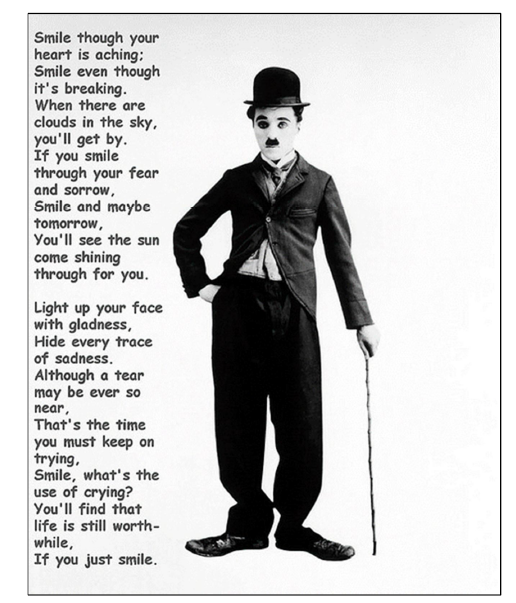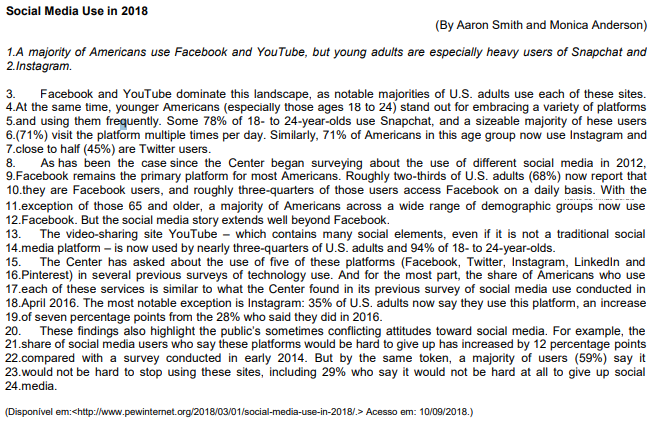Questões de Vestibular de Inglês - Interpretação de texto | Reading comprehension
Foram encontradas 4.863 questões
Read the article “The Olympic Games”, to answer question.
The Olympic Games
The ancient Olympic Games were originally a festival, or celebration of and for Zeus; later, events such as a footrace, a javelin contest, and wrestling matches were added. The Olympic Games were a series of athletic competitions among representatives of city-states and one of the Panhellenic Games of ancient Greece. They were held in honor of Zeus, and the Greeks gave them a mythological origin. The first Olympics is traditionally dated to 776 BC. They continued to be celebrated when Greece came under Roman rule, until the emperor Theodosius I suppressed them in AD 393 as part of the campaign to impose Christianity as the State religion of Rome. The games were held every four years, or olympiad, which became a unit of time in historical chronologies.
During the celebration of the games, an Olympic Truce was enacted so that athletes could travel from their cities to the games in safety. The prizes for the victors were olive leaf wreaths or crowns. The games became a political tool used by city-states to assert dominance over their rivals. Politicians would announce political alliances at the games, and in times of war, priests would offer sacrifices to the gods for victory. The games were also used to help spread Hellenistic culture throughout the Mediterranean. The Olympics also featured religious celebrations. The statue of Zeus at Olympia was counted as one of the seven wonders of the ancient world. Sculptors and poets would congregate each olympiad to display their works of art to would-be patrons.
The ancient Olympics had fewer events than the modern games, and only freeborn Greek men were allowed to participate, although there were victorious women chariot owners. As long as they met the entrance criteria, athletes from any Greek citystate and kingdom were allowed to participate, although the Hellanodikai, the officials in charge, allowed king Alexander I of Macedon to participate in the games only after he had proven his Greek ancestry. The games were always held at Olympia rather than moving between different locations as is the practice with the modern Olympic Games. Victors at the Olympics were honored, and their feats chronicled for future generations.
Available at:<https://en.wikipedia.org/wiki/Ancient_Olympic_Games> . Access on: 23 mar. 2018.
TEXT I
Sonnet 18 William Shakespeare

Available at: <http://www.shakespeare-online.com/sonnets/18detail.html>. Acess on: 23 mar. 2018.
Notes: Thee: you Thou art: You are temperate: constant Bud: a small part of a plant that develops into a flower the eye of heaven: the sun dimm’d: become less bright fair: beauty nature’s changing course: the passing of time thou ow'st: you possess
TEXT II Lego House
Ed Sheeran

Chorus (lines 13 to 23):

Chorus (Repeat)

Chorus (Repeat)
Available at: <https://vagalume.com.br> . Acess on: 23 mar. 2018. Adapted.
All of the statements are according to the texts I and II, EXCEPT FOR the alternative:
Read the following passage, paying attention to the words numbered 1-5
Gene Wilder’s passing away, the eternal Willy Wonka
After analyzing items I-V, check the CORRECT option.
Analyze the following diagram and then check the CORRECT statement.

Fonte: Available at: <http://www.unicef.org/factoftheweek/index_53803.html>. Accessed on: 10 set. 2016.
Read the lyrics for the song “Smile”, by Charlie Chaplin.

Available at: <https://www.linkedin.com/pulse/charlie-chaplin-michael-buble-say-smile-unforgettable-ritzya>.Accessed on: 20 set. 2016.
Put T (true) or F (false) by the propositions below and then check the CORRECT sequence:
( ) The song suggests we should not smile if our heart is aching.
( ) Life still has meaning, despite fear and sorrow, if you just smile.
( ) Since life has no meaning at all, there is no use smiling.
( ) The song’s overall meaning is to motivate us to remain positive.
( ) The song encourages us to give up the pleasures of life.
Published in 1981, Todd Strasser’s The Wave recounts a true incident that took place in a history class at a Palo Alto, California, high school in 1969. The teacher of the class, Ron Jones, (1)__________ is fictionally renamed Ben Ross in the book, actually formulated the experiment described in the narrative in an effort to help his students understand how the Holocaust could have happened without the mass condemnation of the German people. What begins as a simple class project quickly takes on a life of its own, (2) __________, as students conform mindlessly to the experimental system, and others are pressured ruthlessly to join in. Group dynamics and peer influence bordering on coercion create a sinister atmosphere of fear and mistrust, The Wave spontaneously takes on the characteristics of a cult. The event disrupts an entire school (3) __________ raises a plethora of dark questions concerning responsibility, freedom, and group dynamics. Ron Jones calls it “one of the most frightening events ever experienced in the classroom.” As a novelization of a teleplay by Johnny Dawkins, based on a short story by Ron Jones, Strasser’s book (4) __________ not have attracted an abundance of criticism as a literary entity in itself, (5) __________ The Wave clearly holds an important place in the canon of young adult literature. (…) Available at: <http://www.enotes.com/topics/the-wave/critical-essays>. Accessed on: 20 set. 2016
Choose the CORRECT alternative..
Leia o TEXTO 03 para responder à questão:

Leia o TEXTO 02 para responder à questão:

(Disponível em:.m:<http://www.incredibleteam.com/incredible-marketing-news/social-media-does-advertising-pay/> Acesso em: 10/09/2018)
TEXTO 01

TEXTO 01

TEXTO 01

TEXTO 01

TEXTO 01

Assinale a alternativa que apresenta informações corretas:






